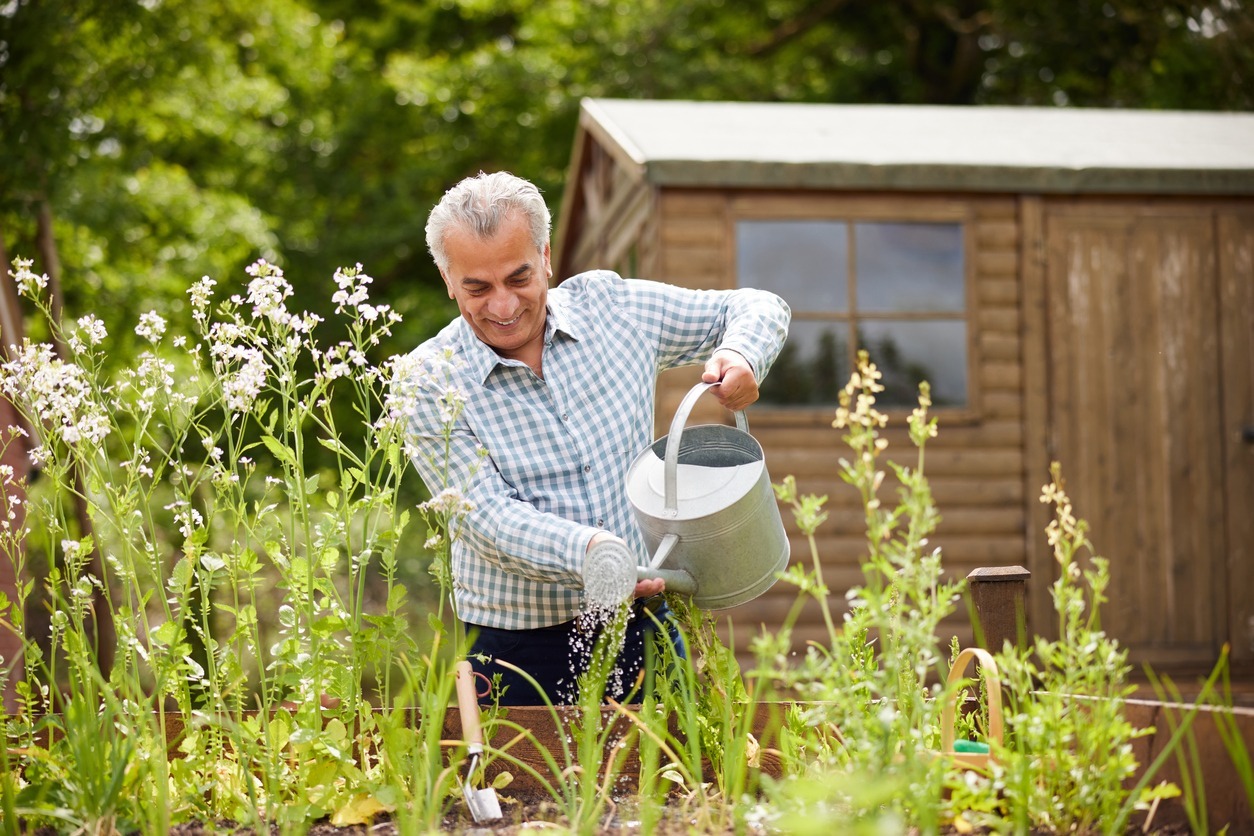Just like many activities, gardening is considered a hobby that brings various benefits to human health, particularly mental health. Nature has always been the support for humans in so many ways and gardening becomes just another way to peace out from various mental issues such as stress and depression. Over the years, many studies have shown the positive effects of gardening on mental health.
Gardening as a Hobby
In broad terms, gardening can be defined as a hobby where people tend to invest their time and resources in plants of different types, mainly in their lawns or gardens. This small-scale hobby does not require much time and energy which is why it has been a favorite for many people, no matter their age. Gardening requires the gardener to plant new plants, water them, provide them with fertilizer, take care of sunlight, and protect them from adverse weather conditions. People who are interested in gardening grow a variety of fruits, vegetables, and flowery plants in their backyard.
Two girls planning a pot
Happy Asian mother and daughter smiling, wearing gloves and working in the garden. family leisure time at home gardening.
Benefits of Gardening on Mental Health
The following health benefits have been noticed in people who have been gardening for a long time.
Reduced Stress Levels
People who have invested their time and energy in gardening have shown visibly improved levels of stress and mental health. They have fewer issues related to anxiety, depression, and various other mental issues as well. One study conducted in Berkshire, Hampshire, and South Oxfordshire reported that 80% of the participants among the 317 people had an improvement in mental health. Of the 317 people, 93% felt an improvement in confidence and motivation.
In addition to that, in many surveys, gardeners have said that they are interested in pursuing gardening as a hobby because it helps them relax. Considering this, everyone who is undergoing some sort of pressurizing situation or problem should try to spend a few days gardening. Hopefully, this will help in improving mental health too.
Provides a Sense of Accomplishment
Gardening is not a one-day job rather it requires consistency and dedication towards the plant. You need to water it regularly and take care of the plant to make sure it grows suitably. As a result, when the plant grows fully, it gives a sense of accomplishment and victory to the gardener. This increases the level of dopamine in our body, a molecule that provides a sense of happiness to humans which, in turn, improves mental health as well. Many people enjoy gardening and invest in the right tools and equipment as well, such as a Boonie hat.
A man watering his plants in a garden
Side view of down syndrome adult man watering plants outdoors in vegetable garden, gardening concept.
Teaches Composure and Patience
Some people face mental health issues of anxiety and lack of patience. One way to deal with this is to start gardening because it teaches the concept of staying patient. Plants may take several weeks to months in order to grow properly. Till that time, the gardener only has to invest his time and energy towards the plant without expecting any instant result. This teaches self-composure and patience.
Accepting Failure
Not many people can accept failure easily. They can easily stress out and have anxiety due to failure. Gardening is an activity where there are chances of failure too. Sometimes, a plant may not grow properly because you have not been taking care of it properly. In contrast, sometimes, even with all of your efforts, a plant may wither because of abrupt weather conditions, pest attacks, or any other factors.
This helps teach the gardener about failure. In the long run, it teaches a person that failure is also an important part of life that needs to be accepted. People need to try again and not let failure overcome them, just like a gardener does by growing new plants after one of their withers.
A withered house plant
Neglected dying tropical ‘Syngonum Neon Robusta’ house plant in white flower pot on pink background
Relaxation Due to Greenery
It may sound weird to many but studies have shown that staying around green landscapes improves mental health. It helps in maintaining blood pressure while giving a soothing and relaxing feeling. A person will feel less disturbed when they are around a green environment as compared to other types of environments. Since gardening is primarily based on grassy lawns, there are positive effects on the mental health of a person. Sometimes, this is also related to the fact that staying around nature helps us relax.
Higher Sense of Activity
A person who stays home and does not do any kind of hobby usually isn’t that active mentally. They end up dull and having a boring personalities with not much to do. On the other hand, a person who has started an activity that is both, mentally and physically exhilarating, would provide a higher sense of activity to him. It will create a sharper mindset that is more responsive.
Gardening helps in improved mental health
Gardener portrait
Nutrition-Filled Diet
People often engage in gardening because they want to grow their food. Growing your plants would assure you that the food has no chemicals in it. Knowing where your food comes from will give you a sense of security.
Aside from that, there are also mental health benefits of having a kitchen garden. When you eat healthy and fresh food from your garden, it boosts your physical health and your mental health through the release of endorphins – your happy hormones.
Daily Physical Activity
You may sweat as much or just a little, depending on the size of your garden. Sweating is not only good for the body but also good for the mind. Sweating helps you to stay fit, burn calories, and boost your immune system. More importantly, sweating also encourages your body to produce endorphins and serotonin – the happy hormones. Sweating and releasing these hormones will help you regulate your mood, have a good sleep quality, and develop a good memory.
Physical exercise has been known to create positive effects on mental health and many studies have concluded this statement as well.
Step by step growth process of a plant
Growing plant. Sprout growth process. Steps sequence of germinating seeds for seedlings. Development cycle of vegetables in nature, appearance of roots and first leaves. Vector evolution phases set
Developing a Mindful Growth
While gardening, sometimes, things go wrong and not as planned while other times, they go just as we wanted them to be. It is just a reflection of life and how we have to deal with things when some of them go our way and some of them do not. Instead of stressing, gardening teaches us to “Improvise, Adapt, and Overcome” the problem.
Being Mindfully Present
View this post on Instagram
Gardening also helps a person practice mindfulness, which means that we stay aware of what we’re doing in the moment. When someone is weeding, planting seeds, or doing any other form of gardening, the task usually requires our full attention. As a result, many people who garden say that they get a centering effect while working on their piece of land.
The sense of peace one gets with gardening can lead to a lot of positive results. Those who practice mindfulness often say that it helps them stay calm and even helps them build better relationships.
While it is technically possible to listen to podcasts, music, or audio books while you’re gardening, it’s not a common practice. Most gardeners prefer to focus on the moment, especially if the gardening task is a sensitive one. One has to make sure that the soil is just right, that the leaves are not dry, and many other precautions. Multitasking along with gardening is simply not possible most of the time. Plus, gardening is almost a sacred activity for some, so it’s a good chance for us to practice mindfulness and enjoy where we are.
Accepting Imperfection
View this post on Instagram
Along with accepting failure, it’s also important for a gardener to allow for imperfections and unpredictability in their lives. Gardening helps us accept that there will always be things beyond our control; for instance, some seeds just won’t sprout even if you do everything right.
A lot of our unhappiness and suffering stems from not being in control of certain things. With gardening, though, one gets the reminder that full control is simply not possible, but that’s not really a bad thing. When you spend time with your family in the garden, it’s an enjoyable experience but one that can also lead to a few losses in terms of flowers, crops, and other plants.
Accepting imperfection doesn’t mean that you’re defeated. What we have to do is put in our best efforts; after that, we have to let go and let nature take its course. If a child breaks some flowers or squashes some tomatoes, we have to understand that it’s a part of a garden’s delights.
Reduced Dependency on Technology
View this post on Instagram
Many individuals find it very difficult to live without their phone for even an hour. Working in nature, however, can help you take a much-needed break from technology. When we’re scrolling on social media, we see everyone having seemingly perfect lives. We see expensive products that promise to make life easier, better, and more exciting. These activities have been linked to depressive thoughts, so it’s much better to focus on your garden and let the phone be for a while.
Moreover, gardening grants you a sense of having accomplished something. On a phone, computer, or a TV screen, hours can pass without any productive output. In a garden, you use your time wisely; any activity is useful. You benefit the plants by watering them, work on some crops, and get in your exercise at the same time.
With all of the mental health benefits of gardening mentioned above, it brings an overall change to the personality as well. It helps a person in mental growth and acceptance of different things. The mind becomes quite strong and able to fight different types of problems as well as develop a growth mindset as well. The “Think out of the box” ability is polished with a major improvement in the thinking perspective of a person too. Sometimes, gardening turns into Aquascaping, which is also an interesting activity.
Conclusion
Gardening is surely one of the best activities one can perform to have significant improvement in their mental health. It will help you re-energize while getting close to nature. There are already proven results of gardening to people in the form of improved stress management, lower anxiety, and reduced depression which is why you should consider making it a hobby as well.




